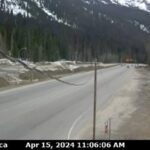Home »

Critics praise old growth report but…
 “Perceptions,” by Gerry Warner
“Perceptions,” by Gerry Warner
“A bitter pill.”
That’s how B.C. author and conservationist Jim Cooperman described the strategic report on old growth timber preservation released Friday by Forests Minister Doug Donaldson that was supposed to go a long way to end the “battle in the woods” that has plagued the province for years.
But Cooperman and several other forestry critics say the 72-page report, while solid in itself, has been “spun” by the provincial government, which has a different agenda.
The report authored by professional foresters Al Gorley and Garry Merkel names
nine areas, mostly on the Coast, where logging will be “deferred” on 352,739 hectares of old growth and up to 1,500 particularly tall trees around the province will be saved from the loggers’ chain saw. In the Interior, the only sizable chunk of old growth to be saved is 40,194 hectares in the Incomappleux Valley southeast of Revelstoke and smaller patches of ancient trees in the Crystalline and Stockdale Creek drainages both located in the East Kootenay.

At first blush, the 352,739 hectares of deferred old growth logging stated in
Donaldson’s press release sounds impressive but as usual the devil is in the details, says Cooperman. “In light of the details I found, the Gorley-Merkel report appears to have been used by Donaldson as little more than sugar coating around a bitter pill. The bitter pill is that, at best, Donaldson is deferring logging for two years on 64,191 hectares, almost all of it in Clayoquot Sound.”
Cooperman adds when he discussed Donaldson’s release with long-time forestry activist and Order of Canada recipient Vicky Husband she didn’t mince her words. “The government’s response to the Gorley-Merkel old growth report is a shoddy piece of spin-doctoring in advance of an election. It is duplicitous in intent; short on facts; and intentionally misleading for the electorate giving the appearance of doing something when the reality is to keep the industry logging the little remaining productive old growth.”
But Wildsight Conservation Director John Bergenske says he found the Gorley-Merkel Report credible. “The report is strong, the authors state clearly in the introduction that all recommendations need to be followed, but the province seems to have ignored one of the primary recommendations, that areas of old growth under imminent threat need to be reserved while assessments proceed, including consultation with Indigenous nations.”
Bergenske says he strongly agrees with the main theme of the report that society is undergoing a paradigm change in its attitude towards logging and concern is building over loss of biodiversity and prime wildlife habitat in many old growth ecosystems.
But just “deferring” old growth logging is not good enough, he says. “I had no idea that they were talking only about a deferral that would be used as cover for failing to put a moratorium on threatened stands of old growth . . . I am having a hard time in being anything but cynical about government reaction to a well thought out report. It appears an attempt to mislead the public into thinking that 350,000 hectares of old growth has been protected, so far from the truth.”
Wildsight Conservation Specialist Eddie Petryshen points out that much of the
approximately 350,000 hectares of old growth forests to be protected weren’t in any imminent danger to be logged in the first place because they weren’t listed on the government’s Timber Harvesting Land Base list. “There is no doubt that there is a lot to be done to address the crisis in British Columbia’s forests. The report presents a strong argument for change, but the province’s reaction is disappointing.”
Despite the report’s call for change, there’s very little in it on clear cutting other than to say it’s “traditionally” the dominant logging method in the province and the “least expensive for industry” and will continue, albeit with some mitigating changes. Critics blame clear cutting for destroying the aesthetic appearance of the forest as well as reducing wildlife habitat, causing land slides and floods and contributing to climate change by adding carbon to the atmosphere through slash burning.
Despite this, Bob Brash, executive director of the Truck Loggers Association, praised the report. “The government has sent out the right messages. We will take the minister at his word about doing this the right way.”
But Torrance Coste, who speaks for the BC Wilderness Committee, wasn’t so sure. “Old-growth forests in B.C. are in crisis and today the government has acknowledged logging them is unsustainable.”
Gerry Warner is a retired journalist who spends as much of his life as he can in
the forest.







